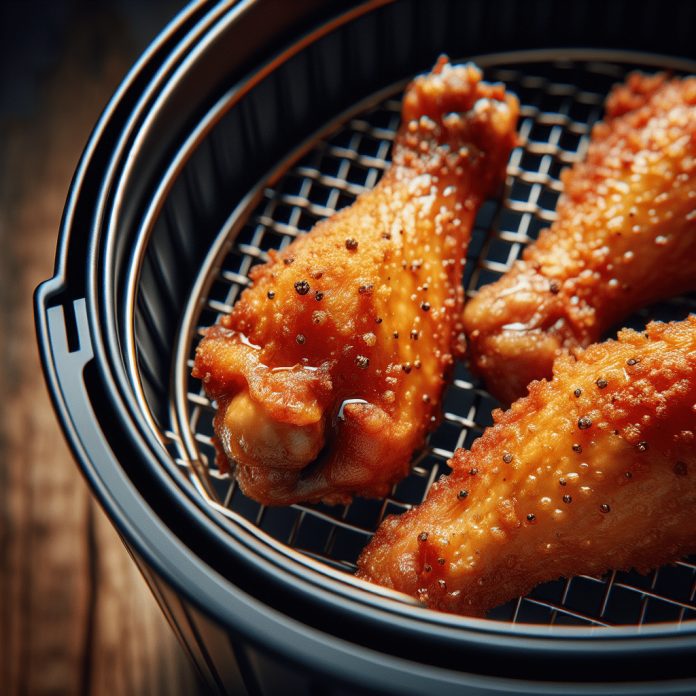Curious about how to overcome the most common issues that arise when using an air fryer? Look no further! In today’s article, we’ve compiled a list of the most frequent air fryer problems and provided some simple troubleshooting tips to help you navigate these kitchen conundrums with ease. Whether you’re dealing with uneven cooking, unpleasant odors, or a lackluster crispy texture, we’ve got you covered. So grab your favorite snacks and let’s dive into the world of air fryer problem-solving!
Common Air Fryer Problems and Easy Troubleshooting Tips
Air fryers have become a popular kitchen appliance in recent years, offering a healthier alternative to traditional deep-frying. However, like any other kitchen appliance, air fryers can encounter some common issues that can affect their performance. In this article, we will explore the most common air fryer problems and provide you with easy troubleshooting tips to help you resolve them.
1. Air Fryer Not Heating
1.1 No Power Supply
One of the most common reasons why an air fryer may not be heating is due to a lack of power supply. Make sure that the appliance is properly plugged into a functioning power outlet. Check the power cord for any damages or loose connections. If the power supply is functioning properly, move on to the next troubleshooting tip.
1.2 Faulty Heating Element
If your air fryer is not heating up at all, it may indicate a faulty heating element. In this case, it is best to contact the manufacturer or a qualified technician for further assistance. They will be able to diagnose the issue and either repair or replace the heating element as needed.
1.3 Overheating Protection
Air fryers are equipped with built-in safety mechanisms to prevent overheating. If you find that your air fryer is not heating up or shuts off unexpectedly, it may be due to the overheating protection mechanism being activated. Allow the appliance to cool down for a while and then try using it again. If the problem persists, it is advisable to contact the manufacturer for assistance.
1.4 Timer Not Set Correctly
Sometimes, the air fryer may appear to not be heating when, in reality, the timer is not set correctly. Double-check the timer settings on your air fryer to ensure that it is set to the desired cooking time. If the timer is not set or set incorrectly, adjust it accordingly and try again.
2. Uneven Cooking
2.1 Incorrect Temperature Setting
If you notice that your food is not cooking evenly in the air fryer, it may be due to an incorrect temperature setting. Make sure you are setting the temperature according to the recipe instructions or the recommended guidelines for the specific food you are cooking. Adjust the temperature accordingly and monitor the cooking process to ensure even cooking.
2.2 Excessive Food in the Basket
Overloading the air fryer basket can lead to uneven cooking. The hot air needs to circulate around the food for it to cook properly. Avoid overcrowding the basket and cook in smaller batches if needed. This will allow the hot air to circulate evenly, resulting in uniformly cooked food.
2.3 Inadequate Preheating
Preheating the air fryer is essential for ensuring even cooking. If you skip the preheating process, the air fryer will need more time to reach the desired temperature, resulting in unevenly cooked food. Preheat the air fryer for a few minutes before adding the food to ensure consistent and even cooking.
2.4 Airflow Obstruction
An obstructed airflow can also cause uneven cooking in an air fryer. Check the air vents and ensure that they are not blocked by any objects or food particles. Clean the vents thoroughly to allow proper airflow. Additionally, avoid placing the air fryer too close to the wall or other objects that may obstruct the air circulation.
3. Food Not Crispy
3.1 Insufficient Oil
If your food is not turning out crispy as desired, it may be due to insufficient oil. While air fryers require less oil compared to traditional deep-frying, a small amount of oil is still necessary to achieve the desired crispiness. Add a light coating of oil to the food before placing it in the air fryer. This will help enhance the texture and crispiness of the food.
3.2 Wet or Frozen Ingredients
Using wet or frozen ingredients can also impact the crispiness of the food. Ensure that your ingredients are dry before placing them in the air fryer. If using frozen ingredients, thaw them thoroughly and pat them dry before cooking. This will help prevent excess moisture in the air fryer and maintain crispiness.
3.3 Overcrowding the Basket
Similar to the issue of uneven cooking, overcrowding the air fryer basket can result in food not being as crispy as desired. Allow enough space between the food items to ensure proper circulation of hot air. This will help the food cook evenly and achieve a crispy texture.
3.4 Inadequate Shaking or Flipping
For certain foods, such as fries or chicken wings, shaking or flipping during the cooking process is crucial to ensure even crispiness. Periodically shake or flip the food in the air fryer basket to promote even browning and crispy texture. This will prevent any one side of the food from becoming soggy or undercooked.
4. Excessive Smoking
4.1 Excessive Oil Residue
Excessive smoking from the air fryer is often caused by a buildup of oil residue. Regularly clean the air fryer basket, tray, and any other removable parts to remove any oil or food residue that may have accumulated. This will prevent excess smoke during the cooking process.
4.2 Incorrect Temperature
Cooking at an incorrect temperature can also lead to excessive smoking. Ensure that you are setting the air fryer to the correct temperature for the food you are cooking. Refer to the recipe instructions or recommended guidelines for the appropriate temperature setting.
4.3 Grease Build-up on Heating Element
If you notice excessive smoking coming from the air fryer, it may be due to a grease build-up on the heating element. Cleaning the heating element regularly using a damp cloth or sponge will help remove any accumulated grease, reducing the chance of excessive smoking.
4.4 Using Incorrect Cooking Spray
Certain cooking sprays can produce more smoke when used in an air fryer. Opt for cooking sprays specifically labeled for use in air fryers, as they are designed to produce less smoke. Alternatively, you can use a small amount of oil applied directly to the food to prevent excessive smoke.
5. Unpleasant Odors
5.1 Food Residue in Air Fryer
If your air fryer is emitting unpleasant odors, it may be due to food residue that has not been properly cleaned. Regularly clean the air fryer basket, tray, and any other removable parts to remove any lingering food residue. This will help eliminate any unpleasant smells during the cooking process.
5.2 Dirty Air Filter
Some air fryers are equipped with removable air filters. If your air fryer has an air filter, check and clean it regularly. A dirty air filter can contribute to unpleasant odors. Refer to the manufacturer’s instructions on how to properly clean the air filter.
5.3 Overcooked or Burned Food
Overcooking or burning food in the air fryer can also lead to unpleasant odors. Be mindful of the cooking time and temperature settings to avoid overcooking. Follow recipes or recommended guidelines for cooking times and temperatures to ensure the best results and prevent any lingering smells.
5.4 Insufficient Cleaning
Regular and thorough cleaning is key to preventing unpleasant odors in your air fryer. Make sure to clean all removable parts, including the basket and tray, after each use. Use warm soapy water and a non-abrasive sponge to clean the interior and exterior of the air fryer. Allow all parts to dry completely before reassembling.
6. Non-Stick Coating Peeling Off
6.1 Poor Quality Non-Stick Coating
In some cases, the non-stick coating on the air fryer basket may start to peel off over time. This can be due to a poor quality coating. Consider contacting the manufacturer for a replacement basket or inquire about a warranty if this issue occurs within the warranty period.
6.2 Improper Cleaning Methods
Using abrasive sponges or harsh cleaning agents can also contribute to the peeling of the non-stick coating. Always use a non-abrasive sponge and mild dish soap when cleaning the air fryer basket. Avoid harsh chemicals or scrubbing too vigorously, as this can damage the non-stick coating.
6.3 Using Sharp or Metal Utensils
Using sharp or metal utensils in the air fryer basket can scratch or damage the non-stick coating, leading to peeling. Opt for silicone, plastic, or wooden utensils when handling the food in the air fryer. These utensils are gentle on the non-stick coating and minimize the risk of peeling.
6.4 Excessive Scrubbing
Excessive scrubbing of the non-stick coating can cause it to peel off. If there are stubborn food particles stuck to the basket, soak it in warm soapy water for a few minutes to loosen them before gently scrubbing. Avoid scrubbing too vigorously, as this can damage the non-stick coating.
7. Basket Sticking to the Bottom
7.1 Grease Accumulation
Grease accumulation on the bottom of the air fryer basket can cause it to stick. Regularly clean the bottom of the basket to remove any grease or food residue that may have dripped down during the cooking process. This will ensure that the basket slides in and out smoothly.
7.2 Warped Basket
A warped air fryer basket can also lead to it sticking to the bottom. If you notice that your basket is no longer flat, it may be due to warping. Contact the manufacturer for a replacement basket if this occurs, as a warped basket can affect the overall performance of the air fryer.
7.3 Deformed or Damaged Heating Element
If the basket continues to stick to the bottom despite cleaning and a non-warped basket, it may be due to a deformed or damaged heating element. In this case, it is best to contact the manufacturer or a qualified technician for assistance. They will be able to diagnose the issue and provide a solution.
7.4 Misaligned or Loose Components
Misaligned or loose components within the air fryer can also cause the basket to stick to the bottom. Carefully inspect the interior of the air fryer for any misaligned or loose parts. If you notice any, try realigning or tightening them as necessary. If the problem persists, contact the manufacturer for further assistance.
8. Error Codes or Malfunction
8.1 Power Interruption
If you encounter error codes or malfunctions with your air fryer, it may be due to a power interruption. Unplug the air fryer from the power outlet for a few minutes, then plug it back in and try again. This can help reset the appliance and resolve any temporary electrical issues.
8.2 Sensor Malfunction
Error codes may also indicate a sensor malfunction. Consult the user manual or contact the manufacturer for information on troubleshooting specific error codes. In some cases, a sensor malfunction may require professional assistance or a replacement part.
8.3 Control Panel Issues
Control panel issues can lead to error codes or malfunctioning of the air fryer. Check for any visible damage or loose connections on the control panel. If you notice any issues, contact the manufacturer for guidance on how to resolve the problem.
8.4 Overheating Mechanism Activated
Overheating protection mechanisms in air fryers can sometimes be triggered, resulting in error codes or malfunctions. Allow the appliance to cool down for a while and then reset it. If the problem persists, contact the manufacturer for further assistance.
9. Weird Noises
9.1 Loose or Misaligned Parts
Weird noises coming from the air fryer can indicate loose or misaligned parts. Carefully inspect the appliance and tighten any loose parts or screws that may be causing the noise. Ensure that all components are properly seated and aligned. If the noise continues, contact the manufacturer for further guidance.
9.2 Faulty Fan Motor
A faulty fan motor can also be a cause of weird noises in an air fryer. If you suspect an issue with the fan motor, contact the manufacturer or a qualified technician for assistance. They will be able to diagnose the problem and provide the necessary repairs.
9.3 Wear and Tear on Interior Components
Over time, wear and tear on the interior components of the air fryer can cause strange noises. Regular cleaning and maintenance can help prevent this. If the noises persist, it may be necessary to replace certain interior components. Contact the manufacturer for further guidance.
9.4 Inadequate Lubrication
Inadequate lubrication of moving parts can also result in weird noises. Consult the user manual or contact the manufacturer for instructions on how to lubricate the necessary parts. Be sure to use a lubricant recommended by the manufacturer to avoid any damage to the air fryer.
10. Power Cord Issues
10.1 Loose Connection
If you are experiencing power cord issues, such as intermittent power or a complete loss of power, check for any loose connections. Ensure that the power cord is securely plugged into both the air fryer and the power outlet. If the issue persists, try using a different power outlet to determine if the problem lies with the original outlet.
10.2 Damaged Power Cord
A damaged power cord can also cause power issues. Inspect the power cord for any signs of damage, such as frayed wires or exposed conductors. If you notice any damage, it is crucial to replace the power cord to ensure safe operation of the air fryer. Contact the manufacturer or a qualified technician for a replacement power cord.
10.3 Faulty Power Outlet
If your air fryer is not receiving any power, it may be due to a faulty power outlet. Try plugging another device into the same outlet to determine if the issue lies with the outlet itself. If the outlet is indeed faulty, contact a certified electrician to resolve the problem.
10.4 Electrical Short Circuit
In rare cases, a power cord issue may be caused by an electrical short circuit within the air fryer. If you suspect a short circuit, it is essential to unplug the air fryer immediately and contact the manufacturer or a qualified technician for assistance. Attempting to repair a short circuit without proper knowledge or expertise can be extremely dangerous.
In conclusion, while air fryers are convenient and versatile kitchen appliances, they are not immune to common problems. By troubleshooting the issues mentioned above, you can address and resolve most air fryer problems on your own. Remember to follow the manufacturer’s instructions and guidelines to ensure safe and optimal performance of your air fryer. Happy air frying!





































